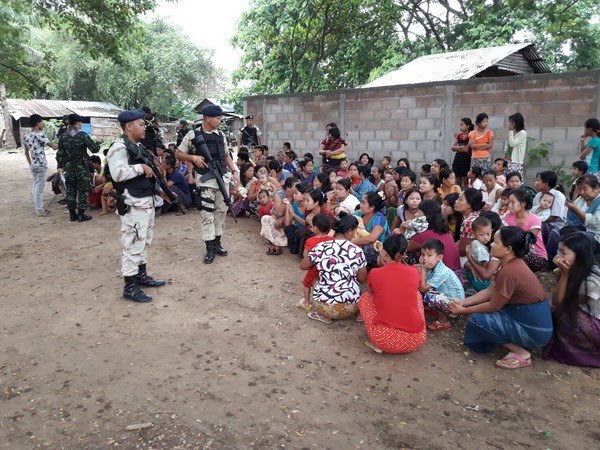The arrest of thousands of Burmese migrants in Thailand over the last 10 days is linked to the end of the temporary residence registration period for foreign workers, according to migrant rights groups.
“At the end of every registration period, migrant workers’ identification papers are checked and authorities generally do a sweep to clear out the people with no documents,” said Brahm Press, director of the Migrant Assistance Program (MAP) Foundation.
Many migrants from Burma hold temporary residence IDs, or “pink cards”, that only allow them to travel within the province they are registered in.
Thailand’s Department of Employment urged employers to ensure their migrant workers from Burma, Laos and Cambodia had completed the registration process allowing them to work in Thailand for another two years before the 29 July deadline under a pink card or face harsh punishments.
At the end of July migrants were arrested in shopping malls, markets and workplaces throughout Thailand.
In the northern city of Chiang Mai, raids have been carried out on construction sites, workers’ dormitories and outdoor markets. Most fines were for workers engaging in work not permitted on their card, or for working for a different employer.
“Some were charged a couple of thousand baht — up to 10,000 baht [US$288], depending on the charge — if their registration cards did not match their employer or change in workplace,” said Press.
Aung Kyaw, chairperson of the Myanmar Migrant Workers Network, said that such crackdowns are common at the end of each registration period. “This is usual. It’s not true that conditions are getting worse since Daw Aung San Suu Kyi’s trip,” he said, denying rumours that the crackdown was related to a 23-24 June visit to Thailand by Burma’s state counsellor.
During that visit, Burma and Thailand signed a Memorandum of Understanding aimed at protecting Burmese migrant workers by providing them with proper documents.
Despite the agreement, however, rights groups say many issues remain unresolved.
[related]
“They really need to work out the kinks in these policies about how migrants are allowed to register, giving them more flexibility, as only certain registration types are allowed to sell in markets, for example,” said Press.
Another issue, according to Aung Kyaw, is a lack of awareness among migrants about how the rules work.
“Workers who hold pink cards do not know [that] they are not allowed to change employers or move to other regions apart from the region” on their cards, he said.
Ye Min of the Aid Alliance Committee (AAC), an advocacy group for Burmese workers in Thailand, said the arrests were wide-reaching, affecting people in many sectors.
“Thai authorities are checking and arresting workers who do not have work permits or who have incorrect documents, who work with different employers or jobs, who run their own businesses or shops, or who sell at the department stores,” he said.
In the border town of Mae Sot, some workers told MAP that there was confusion among workers and employers alike over the status of those registering to work in a special economic zone in the area.
“There are only a certain amount of jobs that migrants are allowed to do but that doesn’t necessarily match reality,” said Press.



